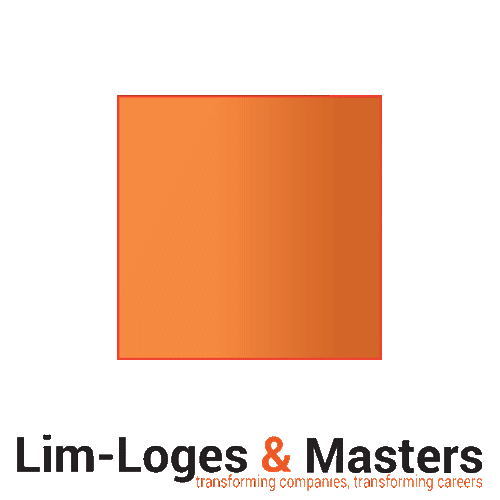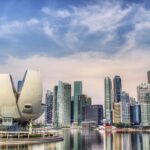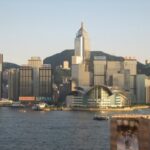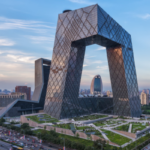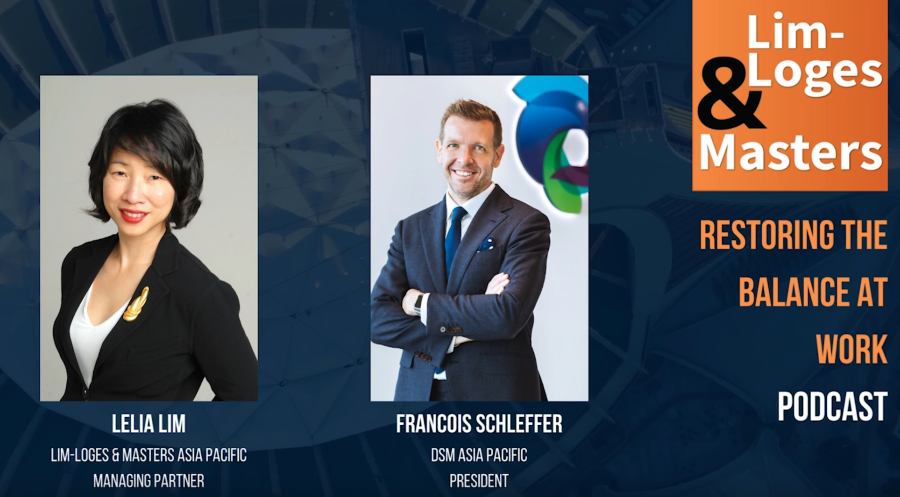
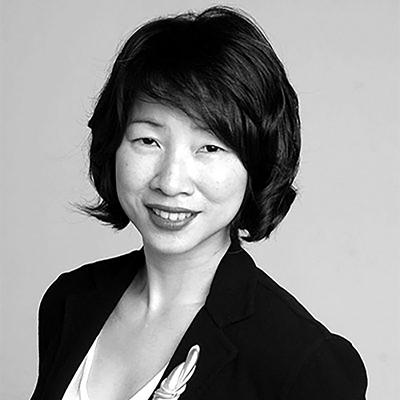
Lelia Lim
ESG – Rebuilding the Employee Landscape. People. Planet.Profit
Episode 1 of the Restoring the Balance at Work podcast series featuring special guest Francois Scheffler, Regional Vice President – Human Nutrition and Care – Asia Pacific & President, DSM Asia Pacific.
Welcome to Lim-Loges & Masters “Restoring the Balance at Work” podcast series looking at the challenges businesses face today and their impact on a disrupted economy. Lim-Loges & Masters is a leading HR consultancy in Asia Pacific that helps organisations transform through their people through three distinct yet connected services, Disruption Management, Executive Search and Transition Management. Today’s podcast is about ESG, rebuilding the employee landscape, people profit planets, and we are joined in the studio by founder and Managing Partner Lelia Lim. Lelia has 30 years of experience in the natural resources industry and executive search. Previously at Korn Ferry International for close to 13 years. Lelia, welcome!
Lelia:
Hello, everybody. And welcome to the quarterly podcast series in Asia by Lim-Loges & Masters. COVID-19, as you know, has moved from being pandemic to endemic today. And this hopefully brings a new age. And so our theme for 2022 focuses a lot on restoring the balance. And today, we are hoping to address the topic of ESG – Environmental, Social and Governance – and its impact on people, profit and planets. Investors, of course, very, very focused on applying these non-financial factors as part of their analysis to identify material risks and growth opportunities.
What are the critical considerations for business leaders looking to create a sustainable and successful workplace? This is the question that we’re raising with our special guest today, Mr Francois Scheffler from DSM. DSM has set five sustainable development goals, aligned with the UN. And these are:
- Ending hunger, achieving food security and improved nutrition and promoting sustainable agriculture.
- Ensuring healthy lives.
- Ensuring access to affordable, reliable, sustainable modern energy for all.
- Combating climate change.
- Ensuring sustainable consumption and production patterns.
Francois is the President for Asia and the Regional Vice President for Human Nutrition and Care, Asia Pacific. He has spent more than 20 years in Europe and Asia and is currently based in Singapore. So welcome, Francois.
Francois:
Thank you very much, Leila. Thank you for having me on the podcast today.
Lelia:
Francois, you are new to DSM we know, but you are definitely well versed in the industry you’re in. So tell us a little bit about your own personal journey and your vision for the future as the Regional President for DSM in Asia Pacific.
Francois:
Yes, absolutely. I actually tried when I was younger to become a chef, a cook. And my parents said, no, you should be a chemical engineer. So that’s what I did. And then, I was fortunate enough to work for two companies that basically taught me everything, Unilever first, and I was based in the Netherlands. And then, I moved to BASF, the German giant chemical company. And I learned a lot from Unilever in terms of marketing and sales, and then at BASF, how you structure businesses and how you run fairly complex things with a set of processes. But also, interestingly, at BASF, a lot of emphasis on people and something that I hope we can talk about today, diversity and inclusion. And then, I moved to DSM in July, last year 2021. And it was really the culmination of the thinking that I went through during the pandemic about how can we improve people’s health? And really, my conviction that you can do that very efficiently through nutrition, and that lots more is possible. And I think DSM is the prime company for a whole set of reasons, and some of them you’ve mentioned, the triangulation and the balance of the ESG with other elements. But this breadth of portfolio and this willingness to address health through nutrition is really what attracted me to DSM. And what makes me feel very much a home in a company that has this as a key purpose.
Lelia:
We are all really excited for you, Francois.
Francois:
Thank you.
Lelia:
But we are also aware that DSM has recently gone through a significant reorganisation. Tell us a little bit more about that.
Francois:
I think DSM for more than 100 years has been involved in the science of nutrition and health, but it also, over the course of its long-studied history, has been involved in a whole range of other businesses. And in the recent year, it became clearer that sustainability is a defining aspect of the 21st century. And the combination of sustainability and our core competency in nutrition, made it a key strategic question for us about where would we put our focus? And would it be possible to carry on putting our focus on basically two really different businesses, one that focuses on, to all intents and purposes, the human, whether its outer shell (the skin) or its inner workings (the health) and another business that focuses and is extremely successful in sustainability in materials and plastic. And we made the decision to choose to focus on what already 80% of our business was, and this was the original reason for our decision to restructure the company in basically four businesses, three in nutrition and health, which will be carrying on forward, and the materials business for which we’re looking at strategic options.
But I really want to emphasise that this is not about a choice of one business is better than the other. This is a choice if we want to make the change that we believe we have the capabilities to do in the health space, then we need to have this laser focus in that space and doing some other things on the side would not be good for that business and would not be good for the main nutrition space.
Lelia:
Yes, yes. And of course, at the very heart of it, is this strong belief in sustainability, isn’t it?
Francois:
Yes.
Lelia:
Sustainability is going to be at the very core of your organisation’s strategy moving forward.
Why is it essential for companies to make a stand for what they believe in, in today’s environment and climate? What are the benefits for the organisation? Its people and the planet? We’d love to hear some of your examples, Francois.
Francois:
I was going to say the reason why it’s important is people. As simple as it sounds, and a little bit corny, but if you think about what we do, we address through our people, people’s needs. So if you don’t focus on people, then it’s going to be very difficult to deliver on health, which is intrinsic to human beings, who we are.
And why sustainability, and why do you have to make a stance? Well, to drive an outcome and motivate people, you have to have a purpose. You can’t motivate people just by numbers. And, of course, we all now know this, and it has evolved over, let’s say, the last 10-15 years. Certainly already, when I worked previously in another company, sustainability had been on the agenda for a very long time because of the European roots. At DSM, it’s the same thing.
In sustainability, often in the past, it was the question of you either go for sustainability and people, and then you’re an NGO. Or you go for business and numbers and you crack the whip, and you get sales through the door, which makes you successful. And I think what’s really – and I’m going to use a word that’s unusual in business – but what’s really beautiful about DSM is that DSM made the choice to combine the two. And I think this is fairly unique that already 10 years ago, at DSM, there was a reflection about, we don’t want to give up on return for shareholders, on delivering solutions to customers that are economical and beneficial. But we also no longer want to forget the benefits to society, of which sustainability is a core one.
And I think what’s also interesting about the definition of sustainability is often people think of sustainability as green, so if it’s a vegetable then it’s sustainable, or if it doesn’t touch any mechanical tools or chemical process, it’s sustainable. But actually, sustainability contains three areas. One is benefits to society. One is, of course, the ecological benefit, which is if you want the green part, and one is the economic benefits because there is no sustainability going forward if it actually doesn’t work out for the economy. So I think this is a little bit of a long answer if you want.
Lelia:
No, no, not at all. And our readers and our listeners love examples of how it’s been applied in your company. Definitely, we’re not really talking about concepts, and we’re not lecturing here, but really sharing some of the insights that you have.
How do companies build an ESG framework that is future-proof for tomorrow’s economic realities? That’s a real issue, isn’t it? And you’ve put it beautifully by talking about how DSM has combined all those features into a sustainable statement. So tell us a bit more about some of the examples.
Francois:
Yes, and I think what’s really interesting about DSM is that it does this at multiple levels of granularity. So, for example, DSM has made a key decision that its senior executives will be rewarded 50% on numbers and 50% on sustainable or sustainability-related goals. And this includes people but also activities in the NGO world if you want.
But then you go one step further, and you don’t just talk about that at a lofty level, but you make it concrete. So, for example, DSM invests in very specific activities, such as a programme in Rwanda where we actually seek to improve the livelihood of smallholder farmers because more than half of agricultural activities in the world are with smallholder farmers. And a lot of them are just about able to produce enough for their families and their very close neighbourhoods. We believe that this is not enough and this is not sustainable. So we’ve invested in a model, I can’t exactly remember the term, but I think it’s AAIF in Rwanda. Here we created an ecosystem that provides an outlet that values the farmer’s output a little bit higher, creating this mini-industrialised concept, and then drives the sales, creating a larger ecosystem. And this has helped 130,000 very small farmers to be more embedded into a structural setup that delivers, in this case, an economical sustainable benefit.
But similarly and differently, in India, we have looked at how we can provide people who have a big need for micronutrients to improve their health – and opportunities to do this without changing their food habits. Because what’s very difficult, especially if you don’t have much income and money to spend, is to go in and say something as strange as “why don’t you take a tablet”, right? People don’t want to do that. So you have to find ways of using food that people usually consume and not changing anything to produce the meal.
So this is rice, for example. So we’re very strong in rice fortification and what we call Eggonomics, which is about fortifying and changing the diet of a chicken to obtain an egg with a much higher concentration of micronutrients. And people can use the egg just like they’ve been using normally. So this way you enter the benefit into the standard ways of living of people.
Lelia:
Yes, yes. And I know your other role, you’ve spoken about it just now, within DSM is to lead the health, nutrition and care in the region. Right? So this example you gave is great, and one of your SDG’s is malnutrition and how to tackle that problem. And we know malnutrition is a big problem, especially in Asia. How does that impact some of your business strategies? How does it provide a platform for growth for you?
Francois:
The simple answer is that we have five segments that we serve in the health, nutrition and care areas. And in the specific nutrition area, because, of course, in personal care, the segments are a little bit different. And one of these segments is what we call Nutrition Improvement. So it’s one of the five core segments. And what’s also interesting at DSM is that it has a very similar size to other segments. So it’s not like something we do on the side when we have a bit of time left. But it’s actually something we invest resources in the same level of professionalism and proficiency as all the other segments. So basically, we integrate it formally into our business. And then we drive this with the same level of scientific innovation that we do all the other businesses.
So, what I think we’ve done really nicely is that we handle nutritional improvement and commitment to the World Food Programme 17 UN goals that you’ve mentioned before as part of our business.
Now, this has sometimes difficult consequences. So, when we’re having a conversation like we’re having about how much we should invest in making rice kernels? Where should we invest? Sometimes the returns are not there. So we have to a little bit triangulate and say, well, what’s the importance of meeting this goal? What is the importance of having a return today versus having a return tomorrow? And we can make compromises because we have added capabilities and other revenue streams that balance things out. So we look at things holistically.
And the last thing I’d like to say about this is, it’s really a strong motivator for the team, because even people who work on the very high end, fancy, let’s say, very high concentrate, for example, Omega 3, for people who can afford it, they feel motivated that they also work for a company that is ready to look at nutrition for everyone.
Lelia:
And how has this been motivating for your employees? Help me understand how it’s become part of their agenda, picking DSM as their employer of choice?
Francois:
We basically have employees who have been hired or who come and interview who say, we came over to talk with you because you have a focus on nutritional improvement; we came over to speak with you because you’re interested in sustainability. Now, we’re certainly not perfect. Certainly, we have to work further, for example, on our contribution to mental health, which is a major issue coming out of the pandemic. But I think employees recognise that this is something we mean seriously, and I was going to say wholeheartedly.
So it’s been very useful in the recruitment and retention of employees. But I think at DSM, we’re also proud that not all the employees stay forever with DSM, but they spread our way of looking at the world around us. So I like this idea and, to some extent, being a little bit of a foundry of another type of leader for the industry.
Lelia:
And hopefully, new visionaries for the future. So as we look at the positives, there are also some negatives, and how you’re navigating ESG trade-offs, for example, in parts of the world, and you see activists who are pushing for completely meat-free diets. How does DSM manage some of these challenges?
Francois:
I think this is a very important question because we have a very substantial animal nutrition business, which covers all the different types of animals, from chicken and bovine all the way to fish. And the view that we’ve taken here is actually quite simple when you think about it – it’s that there is a very large number of people, and therefore on livelihoods, that depend on animal rearing and the animal-derived food industry. And so our view is that if we were to come in and say well because bovine produce a lot of the co2 emissions and the methane, we’re going to stop being in this industry, we would actually endanger the livelihoods of millions of people. And our view as a company is that that’s not helpful, right? It’s helpful for one KPI, but we have a view of a contribution to society that is balanced.
So what we’ve tried to do is say this. It’s about enabling increased sustainability of all the protein sources. And so, we have invested equally into decreasing the methane footprint of cattle farming dramatically. And we’ve just launched and just had the approval in Europe of EFSA for a product called Bova, which decreases by 30% the emissions of methane. And we’re doing this worldwide, right? I’m talking about Europe, but we also have approval in South America. And then, at the same time, we’re investing in meatless alternatives; we just acquired a company that provides the raw material for this. Today I was together with the Dutch ambassador in the lab in Singapore, and we tried flavours that enable these proteins to basically, as the Dutch ambassador said today, taste even better than the original!
So this is exactly the core strength of DSM; it’s to balance things out, to use our resources, our ability on flavours, to improve meatless protein, and our abilities on the science of methane-emission in cattle to improve this as well. And then to look at the farmers and how can we improve their livelihoods? How can we make them more economically sustainable? Because in the end, whether you look at animal nutrition, whether you look at food and beverage, or whether you look at health, nutrition and care, I believe is that if you improve people’s health, food and nutrition, you have a societal effect that is one to 16. So for every dollar invested in better nutrition, you get $16 back for society.
So I understand your question, but how do you make these hard decisions, and of course, they are hard. But in the end, what we have in our field of vision is what our purpose is. And when you have this strong purpose as a guiding light, it’s easier to make these tough decisions. That doesn’t mean we don’t make any mistakes. But we kind of orient ourselves back onto our purpose.
Lelia:
That is so encouraging because at the end of the day, trade-offs may not be that extreme. And that’s what you’re saying; you’re trying to encompass the entire strategy towards meeting specific goals around sustainability. And if that goal means that there is some slight tweaking necessary, you would do so, as opposed to trading it off completely and treating it as a total challenge. I like that. I like that. Really, that’s very, very helpful.
Let’s look at your workplace currently, and as I’ve mentioned, we’ve moved from the pandemic to an endemic environment now. How do you create a successful workplace? How is sustainability an advantage to DSM?
Francois:
I think this is exactly the core of my responsibility as the President of Asia Pacific for DSM. This is part of my job, if you want, compared to my main business responsibility, but it informs a lot of how I look at the whole. The simple answer is, you need to focus on people. And this is simple to say, but it requires really in-depth thinking, especially after the pandemic, about things such as hybrid ways of working. About development, how do you develop people? And we know, for example, that developing people is about learning.
Learning is about the opportunity that we provide for individuals to be curious about what they can do. So this sounds again simple, but it requires daily thinking. So this is what I’m trying to do really, day in, day out. It’s to create an environment for people where they can feel entirely safe and comfortable, that they can be themselves so that they bring their unique talents to the fore with no hindrance, with no feeling of “I can’t talk about this, I can’t do that”. So that really adds up.
So it’s a long-term philosophy, if you want, of taking the idea that if I focus on people and their wellbeing, they will contribute to the sustainability of our operations. They will want to stay and feel comfortable and therefore look after the company as well, so there’s this other aspect.
Of course, an aspect that we haven’t talked about is the very strong importance of customers and, more and more so for DSM as well, of consumers. We have a substantial business that is direct to consumers. And the other aspect that I find very interesting is some days people ask me, “Is it not so difficult to always focus on sustainability?” You have to make these compromises, you have to put solar panels on the roof, and you have to decrease your co2 footprint when you move goods. But actually, all you have to do is be driven by what the consumer wants. And you and I are consumers, right? You and I make choices every day. And when we make these choices more and more, we make sustainable-oriented choices. So when we’re in the supermarket, when we affect something, even if we still travel, we think, ‘am I travelling with an airline that is actually trying to use sustainable fuels?’ Or am I travelling with an airline that never mentions it? Am I going to a hotel that offers for me to recycle my towels or not? So what I’m saying is, we as consumers drive the agenda. And I think at DSM, we tried to listen quite carefully to the consumer of today and to the needs that they may not have even expressed but implicitly mentioned. And that’s a very powerful tool that we have to stick to the path.
Lelia:
And I do believe the employee of tomorrow has so much more information. To be able to regenerate that back to their organisation, their leader, and their purpose is going to be a very powerful tool in terms of driving innovation, new ideas, and even sustainable plans for the future.
I do believe that what you’ve discussed today is very helpful, Francois, and I wish you all the best in this new role. We are very excited. So it’s been a pleasure hearing from you. And I’m sure our audience in Asia will appreciate your inputs, Francois; thank you very much.
Francois:
Thank you so much, Lelia; it’s a pleasure talking with you today.
Lelia:
For our audience, please join Lim-Loges & Masters on LinkedIn for our next podcast. And that’s going to be with Frank Cancelloni, the Global President for Jim Thompson, an international Thai brand, and he will be speaking on rebuilding a culture of recognition and rewarding the new employee. So thank you.
To watch and listen to the full podcast, click here:
